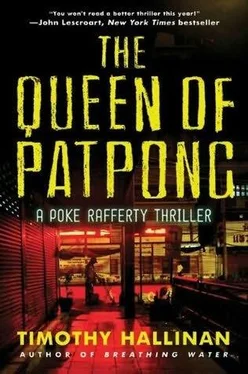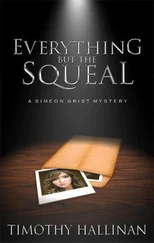Timothy Hallinan - The Queen of Patpong
Здесь есть возможность читать онлайн «Timothy Hallinan - The Queen of Patpong» весь текст электронной книги совершенно бесплатно (целиком полную версию без сокращений). В некоторых случаях можно слушать аудио, скачать через торрент в формате fb2 и присутствует краткое содержание. Жанр: Криминальный детектив, на английском языке. Описание произведения, (предисловие) а так же отзывы посетителей доступны на портале библиотеки ЛибКат.
- Название:The Queen of Patpong
- Автор:
- Жанр:
- Год:неизвестен
- ISBN:нет данных
- Рейтинг книги:5 / 5. Голосов: 1
-
Избранное:Добавить в избранное
- Отзывы:
-
Ваша оценка:
- 100
- 1
- 2
- 3
- 4
- 5
The Queen of Patpong: краткое содержание, описание и аннотация
Предлагаем к чтению аннотацию, описание, краткое содержание или предисловие (зависит от того, что написал сам автор книги «The Queen of Patpong»). Если вы не нашли необходимую информацию о книге — напишите в комментариях, мы постараемся отыскать её.
The Queen of Patpong — читать онлайн бесплатно полную книгу (весь текст) целиком
Ниже представлен текст книги, разбитый по страницам. Система сохранения места последней прочитанной страницы, позволяет с удобством читать онлайн бесплатно книгу «The Queen of Patpong», без необходимости каждый раз заново искать на чём Вы остановились. Поставьте закладку, и сможете в любой момент перейти на страницу, на которой закончили чтение.
Интервал:
Закладка:
Kwan knows that the town is pitifully small and poor, not from having been anywhere else but from the few times she's been able to get near enough to the television to turn the shifting, blurred patterns into identifiable shapes. She's seen the bustling sidewalks and spiky skyline of Bangkok, watched the gleaming cars glide through the streets, seen rich, beautiful, unhappy people double-cross each other in palatial bedrooms and candlelit restaurants where she doesn't even recognize the food. She's seen other, even richer and more beautiful but equally unhappy people double-cross each other in a paradise that's apparently called Korea, where all the women are ravishing and wear astonishing clothes, nicer even than Nana's, and all the men are impossibly princely, and some of them even seem to be tall. Some of them-not the women, but the men-seem as tall as Kwan.
How could people who have everything be unhappy? Kwan wants to know, but there's no one she can ask, since no one she knows has anything.
Except Nana, and she hardly knows Nana anymore.
She has no idea how long she's been standing there, but the stiffness in her back says it's been an hour or more. So she's not completely surprised when she hears the low voices from the other side of the house and then the feet on the steps leading up to the door.
Her mother's voice, raised in greeting, is unfamiliar in its bright friendliness. She's using the voice that's her version of dressing up for company. She never unpacks it for use with her family.
They're here.
Kwan's stomach knots as though she has to go to the outhouse, and her T-shirt is suddenly wet beneath the arms. Moving as silently as a breeze, she rearranges the hanging wash behind her so it completely covers the window, making her invisible from inside the house. She hopes nobody saw the motion. She wishes she were small enough to creep into one of the pockets of her mother's dress, hanging a few inches away.
When her teacher told her that she wanted to have this meeting, Kwan's heart had leaped in hope. Now that the moment has come, though, the hope seems transparently thin, too thin even to hold a patch. If anything, the meeting will make matters worse, not better. It will put an end to the hope.
She smells the whiskey on her father's breath before she hears him behind her.
"Stork," he says. "Your teacher. And some farang man."
She doesn't turn. She tries to stay away from him when he's been drinking. For the past two years, that means all the time. "I don't care," she says.
"Don't talk to me like that. You're big, but you're not too big to hit." He leans toward her, the smell growing stronger, and lowers his voice. "They want to talk about you, and they want you in there."
"There's no point."
"They don't know that," her father says. "They need to hear you say it."
"Maybe I won't say it."
"Maybe you won't eat dinner tonight. Maybe you won't eat breakfast tomorrow. It costs a lot to feed you."
Kwan's clenched fist again drives the post of the earring into her hand. She squeezes harder, inviting the pain in, and then she wheels around and sidesteps, grabbing the clothesline and feeling her father's hand slide over her back and down toward her rear. As it reaches the sensitive skin at the small of her back, she lets go of the rope and hears it snap against his chest.
"Sorry," she says without turning around.
Rounding the corner of the small house, she smells smoke. Someone down the street is burning trash. She thinks hopelessly of the rooms she has seen on the television screen, the careless litter of nameless possessions owned by people who have forgotten they have them, and she wonders what could be useless enough, in this village where there's a third and fourth use for everything, to feed to the flames.
There's a knot of brothers and sisters around the front door. Kwan pushes through them and enters the darkness of the single room they all share.
Teacher Suttikul is short and wide. She's not fat, just broad in the shoulders and hips, and she wears clothes that make her look even wider. Today's outfit is a loose blouse with black horizontal stripes above a straight white skirt. Without ever having owned nice clothes herself, Kwan has known from the first time she saw her teacher that the woman dresses all wrong. Somehow it's endearing that a woman who knows so much about so many things has no idea what clothes she should wear.
"Here she is," Teacher Suttikul says brightly as Kwan comes through the door. "Isn't she pretty?" she asks the man who's with her.
One of Kwan's brothers on the deck snickers.
"This is Mr. Pattison," Teacher Suttikul says, using the English honorific. "Mr. Pattison is from the Children's Scholarship Fund."
Kwan, acutely conscious that her jeans end high above her ankles, conscious of her thin arms and sharp elbows, gives Mr. Pattison a respectful wai, palm to palm as though in prayer, at the level of her forehead. Mr. Pattison smiles. He is taller than she and frayed in the way some older people are, with peeling, papery skin, thinning hair, and eyes of a faded ghost-blue.
"Very pretty," he says in thickly accented Thai, followed by a pale blue glance that silences the laughing boy. "And she looks smart, too."
The room-the only room in which Kwan has ever lived-contains two large pieces of furniture: the bed on which her mother and father and the three youngest children sleep, and a table surrounded by mismatched molded plastic chairs in dark, scuffed primary colors. On top of the table is a scattering of chipped and faded dishes and bowls and a stack of spoons. Above the crockery hang two shelves lined with jars of spices, sugar, and oil, tightly closed against ants. A length of faded cloth dangles diagonally across the far right corner to create a cramped space for people to undress and dress in before and after a bath and, at night, a place for Kwan to sleep. The cloth has been pulled partway aside, and the thin, soiled mat of rags that make up Kwan's bed is in plain sight. The sight stops her in the doorway. Why didn't they just hang her dirty underwear in the middle of the room?
Kwan's mother has pulled the two best chairs away from the table for the teacher and the farang to sit on and has claimed the edge of the bed for herself. She looks up at Kwan and, with her eyes, indicates the high metal stool that's been positioned in the middle of the room. Kwan goes and sits on it as Mr. Pattison and Teacher Suttikul take their seats. Perched there, halfway between them and her mother, she feels like the pile of small money that her father and his drunken friends play cards for, sitting all day on the raised wooden platform outside, next to the street. She catches a glimpse of herself in the cracked mirror hanging beside the door, averts her eyes from the geometrical schoolgirl chop that cuts her straight hair off just below her ears, making her neck look even longer than it is, and ducks her head apologetically, with no clear idea of what she's apologizing for.
"Thank you for letting us come," Teacher Suttikul says.
"Don't thank her." Kwan's father comes into the room, rubbing his chest as though it stings. "If you've got to thank somebody, thank me." He takes a small, inadvertent jog to the right but stops himself before it turns into a lurch, raking the visitors with his eyes to see whether they noticed it. Both of them are looking at Kwan, whose gaze is fixed on her lap, her spine as curved as a cello. Her father goes to the bed, waves his wife to move down although there's plenty of room, and sits heavily.
Teacher Suttikul smiles so appreciatively he might have spouted poetry. "We want to talk about Kwan," she says. "You know, you have a very smart daughter."
"So what?" her father says. He's at the near edge of very drunk, and his consonants are approximate. "She's a girl."
Читать дальшеИнтервал:
Закладка:
Похожие книги на «The Queen of Patpong»
Представляем Вашему вниманию похожие книги на «The Queen of Patpong» списком для выбора. Мы отобрали схожую по названию и смыслу литературу в надежде предоставить читателям больше вариантов отыскать новые, интересные, ещё непрочитанные произведения.
Обсуждение, отзывы о книге «The Queen of Patpong» и просто собственные мнения читателей. Оставьте ваши комментарии, напишите, что Вы думаете о произведении, его смысле или главных героях. Укажите что конкретно понравилось, а что нет, и почему Вы так считаете.












